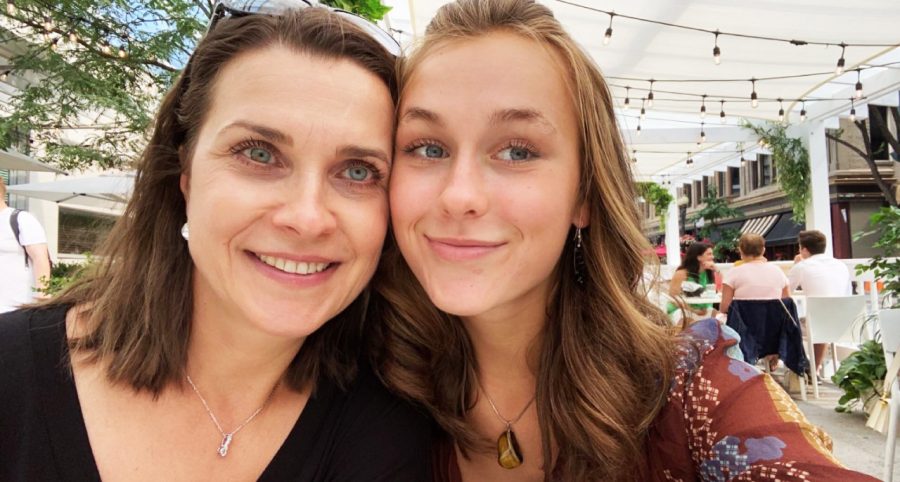Stuck in the middle
Student stuck in the middle between two cultures
Photo by Photo by Sasha Kek
Cayla Stubler, senior, has an American father and a Filipino mother, who “took the reins” when it came to parenting. “I guess you could say it was the stereotypical, Asian parent household, with a lot of respect towards elders, a great stress on respecting your manners, so ‘pleases’ and ‘thank you,’ things like that. [My mother] was forced to assimilate to American culture, but she always implemented Filipino culture of how she was raised in regards to maintaining identity,” Stubler said. “She always made sure that we were proud of being mixed and proud to have a mom that was from the Philippines. We would travel there every other year for Christmas to instill that this is where you’re from. She was very stringent with grades, and I don’t know if that’s completely an Asian thing, but you see all those jokes about it; it was very math and science heavy. We wear house shoes. I guess if we misbehave, we would get a spank on the behind or the wrist with one of our bamboo brooms, and that was the majority of it.”
Multi-cultural students are stuck in the middle of a clash between two different cultures: American and international. Cayla Stubler, senior, is one of those students, who grew up with a Filipino mother and an American father. Although Stubler says her father “took the backseat” when it came to parenting, that did not make it easier for Stubler growing up.
“It was very hard growing up because it’s hard to find a middle ground. It’s hard to appease both sides when one of them wants you to be selfless and another one wants you to prioritize yourself,” Stubler said. “I feel like my parents are two extremes – one of them is very adamant about keeping culture, and the other one doesn’t really care – so there are sacrifices that are made. My name alone was a sacrifice that my mom made; it’s a very American name, my entire name is very white, so I feel like my brother and I were meant to toe the American line because of how much my mom had to give up to be American, and to be successful.”
Even though her mother steered away from her Filipino roots, Stubler says Filipino culture is still prevalent in her home, such as the principle of respect.
“My mom is the one that instilled ‘Yes ma’am, yes sir,’ and my dad did not, so he let my mom take the reins. Respect and manners were something that my parents both prioritized for me and my brother, to the point where other people’s parents told [my parents], ‘Oh my gosh, she said “please” three times in a sentence,’” Stubler said. “[My mother] always implemented Filipino culture of how she was raised, in regards to maintaining identity. She always made sure that we were proud of being mixed and proud to have a mom that was from the Philippines.”
But while her mother encourages her to be proud of her ethnicity, Stubler says she “gets lost” when trying to find a middle ground because “my mom wants me to be proud of Filipino culture, but she’s trying hard to make sure that I’m at an advantage and not treated differently,” which Stubler says she experienced when she came back to from studying in the Philippines.
“My mom had to give up a lot of her culture, and her parents made sure that her and her brother did not have an accent going into college because it puts you at a deficit. I had to learn to give some of that up, because when I came back from the Philippines after studying there my freshman year, I had an accent and I wasn’t treated the same,” Stubler said. “My mom didn’t like it, so that’s why I grew up in American household with Filipino morals; she doesn’t want my brother and I to face discrimination in any sort of way, nor does she want us to be put at a deficit, but my dad capitalizes off of it, like, ‘You can mark Asian on your standardized test or your colleges because you can be a part of the demographic.’ Both of them have tried to make sure that my brother and I are considered equals amongst everyone else.”
One of the effects of having one American and one immigrant parent is “feeling kind of whitewashed and that I didn’t know enough” about Filipino culture, Stubler said, which was one of the reasons why she chose to study in the Philippines during her freshman year.
“I wanted to answer those questions people asked and I wanted to be sound in who I am as a person; it was an identity crisis for a really long time, so I chose to go [to the Philippines] to figure out who I was,” Stubler said. “I felt so comforted when I was over there, especially in school. If I had a question, I could confidently raise my hand, ask the question, the lesson would stop, and we’d make sure that everyone’s on the same page. If someone doesn’t have a good day, everyone’s not having a good day, and we’re going to stop and we’re going to wait until we can fix it; we can’t progress as individuals if we don’t progress as a community. [In America] you get looked at if you ask a question in class, or you don’t know the answer, or if you’re not feeling good and you have to leave the room. [The Philippines] made me feel more safe; it’s very familial.”
Stubler’s mother came to America when she was 17 to study at the University of Illinois on a sponsorship from Stubler’s grandfather’s company. Her mother had to “give up a lot of her culture,” but she still implements core elements of Filipino culture, such as prioritizing other people and giving until you can no longer give, according to Stubler.
“She worked very hard to get to where she is now as a woman, as a woman of color, as an immigrant, so she taught us to be grateful and to give back, which is a big part of the Filipino culture that I believe in. Your parents are your everything and that’s why you respect them, because they gave you this life, and she is that type of mom that gives you everything,” Stubler said. “My dad [says he] grew up with ‘nothing,’ but he did, compared to my mom. My mom grew up in the Philippines, so she’s like, ‘You give what you can because you have the opportunity to,’ because she grew up in a spot where people couldn’t give anymore; they didn’t have anything, and if they did, it was literally the shirt off their back or the only change that they had on their pocket. From my mom’s perspective, coming to America was living the dream; the American dream is still very much alive, and when I studied [in the Philippines] for my freshman year, everyone wanted to come over here and study, or work, or do something.”
Stubler says for a long time “my dad made me choose: you’re white or you’re Asian,” which contributed to her identity crisis. However, through the hardships of trying to find herself, Stubler says “I take pride in being mixed” and embraces it, just as her mother taught her to.
“A lot of people poke fun and say that it’s my personality; okay, it’s my personality. I take pride in being who I am because I find it beautiful that two completely different people from two completely different ends of the Earth could come together and make someone that functions as a regular person with insight most people don’t have,” Stubler said. “I have Filipino morals and I have an American experience, and those two things coupled together make me think differently. Whether it’s a good thing or a bad thing, I am given perspectives of life that are different because a lot of people don’t have the opportunity to see poverty the way that I’ve seen poverty, which makes me believe that I have to be mixed. I have to be a little bit of both because I’m definitely not one or the other.”

This is Sasha’s third and final year working with the Bear Facts staff as the LZ Life Editor. Aside from helping Bear Facts run smoothly, you can find...

![Cayla Stubler, senior, has an American father and a Filipino mother, who “took the reins” when it came to parenting. “I guess you could say it was the stereotypical, Asian parent household, with a lot of respect towards elders, a great stress on respecting your manners, so 'pleases' and 'thank you,' things like that. [My mother] was forced to assimilate to American culture, but she always implemented Filipino culture of how she was raised in regards to maintaining identity,” Stubler said. “She always made sure that we were proud of being mixed and proud to have a mom that was from the Philippines. We would travel there every other year for Christmas to instill that this is where you're from. She was very stringent with grades, and I don't know if that's completely an Asian thing, but you see all those jokes about it; it was very math and science heavy. We wear house shoes. I guess if we misbehave, we would get a spank on the behind or the wrist with one of our bamboo brooms, and that was the majority of it.”](https://www.lzbearfacts.com/wp-content/uploads/2021/12/SK-Cayla-Stubler-Photo-622x900.jpg)
